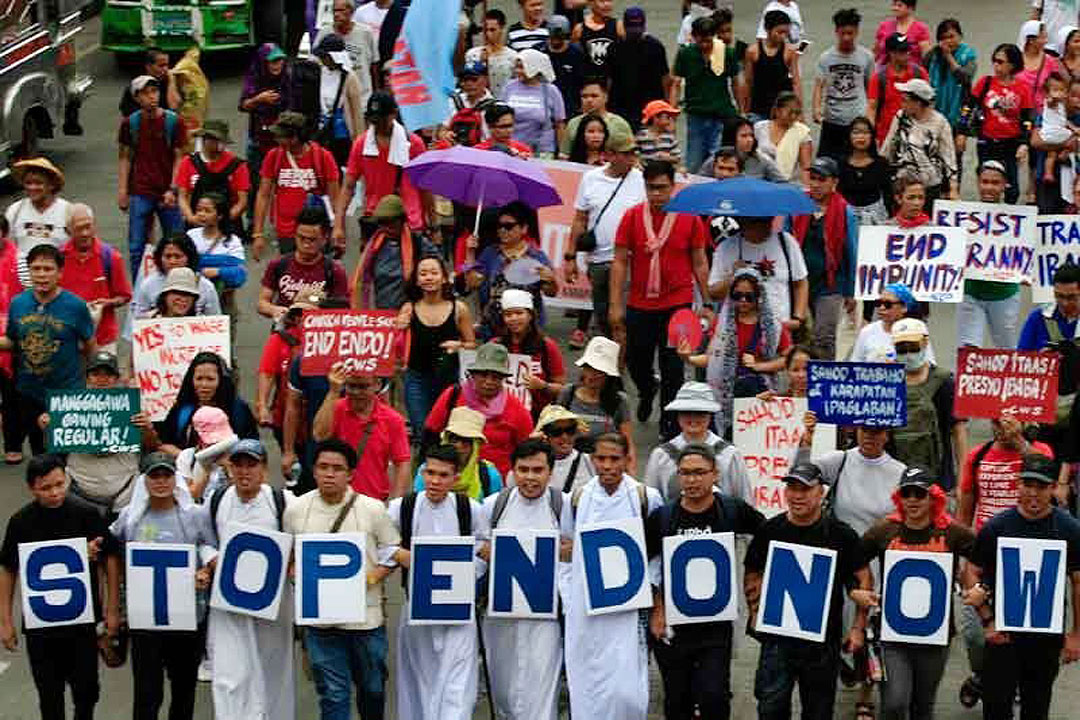PRESIDENTIAL CANDIDATES for next year’s national elections need to consider extending government benefits to contractual workers instead of abolishing labor contractualization, analysts said.
Ateneo de Manila University Economics Professor Leonardo A. Lanzona said that government cannot expect the private sector to provide support to contractual workers and consider the “significant” social gains from enacting policies such as a Universal Basic Income.
He added that while contractualization will remain a key election issue, politicians will have to consider the economic state of the country after the pandemic.
“The pandemic has been made contractualization even more viable as firms are able to cut losses, making workers carry much of the risk as standard work utilizes more telecommunications and virtual communication. Setting up an anti-endo law is like moving against the market tide,” he said in an e-mail to BusinessWorld.
Labor contractualization, also known as “end-of-contract” or endo, denies workers a pathway to permanent employment via five-month contracts. Workers by law are required to be granted permanent status after six months.
Permanent workers are entitled to 13th month pay, health insurance, and annual leave once regularized.
Foundation for Economic Freedom President Calixto V. Chikiamco said high unemployment rates tend to give employers more leverage. Unemployment jumped to 8.9% in September, equivalent to 4.25 million jobless.
“Unless these factors are eliminated, the problem of contractualization will not end, law or no law,” he said in a Viber message.
Mr. Chikiamco instead proposed the amendment to the Labor Code lengthening the probationary period but allowing workers to port their accumulated benefits after they leave a company.
“In an age where whole industries like banks and cars are being disrupted by technology, we should encourage labor mobility, rather than force companies to hire them for life,” he added.
Manila Mayor Francisco M. Domagoso, the Presidential candidate of the Aksyon Demokratiko party, said last month that the issue is “the least of (his) problems,” instead focusing on immediate job recovery from the coronavirus pandemic, if elected.
Meanwhile, Vice-President Maria Leonor “Leni” G. Robredo and Senator Emmanuel “Manny” D. Pacquiao said that they would support moves to end endo in a bid to support workers’ rights to job security.
Abolishing endo was one of the promises of President Rodrigo R. Duterte when he campaigned for President in 2016.
However, he vetoed the Security of Tenure Bill in July 2019 which would have banned outsourcing workers via manpower agencies and granted benefits enjoyed by regular workers to project and seasonal employees.
Trade Union Congress of the Philippines (TUCP) spokesman Alan A. Tanjusay said that the lack of action since Mr. Duterte’s veto has left contractual workers vulnerable to treatment as “disposable commodities.”
“Contractual workers are the most vulnerable during pandemic because they have no unions, they are unorganized and (have) no collective bargaining agreement with principal business owners. Endo workers are easily dismissed without due process and separation pay and benefits,” he said in a Viber message.
Ecumenical Institute for Labor Education and Research Director Rochelle Porras said that the next president should provide “greater representation” to workers in negotiations of labor laws.
“To balance the interests of workers and employers, our government officials sometimes forget that the majority of the workers are already exploited to begin with, given the low minimum wages, rampant contractualization, and violations of trade union rights,” she said in an e-mail. — Russell Louis C. Ku
